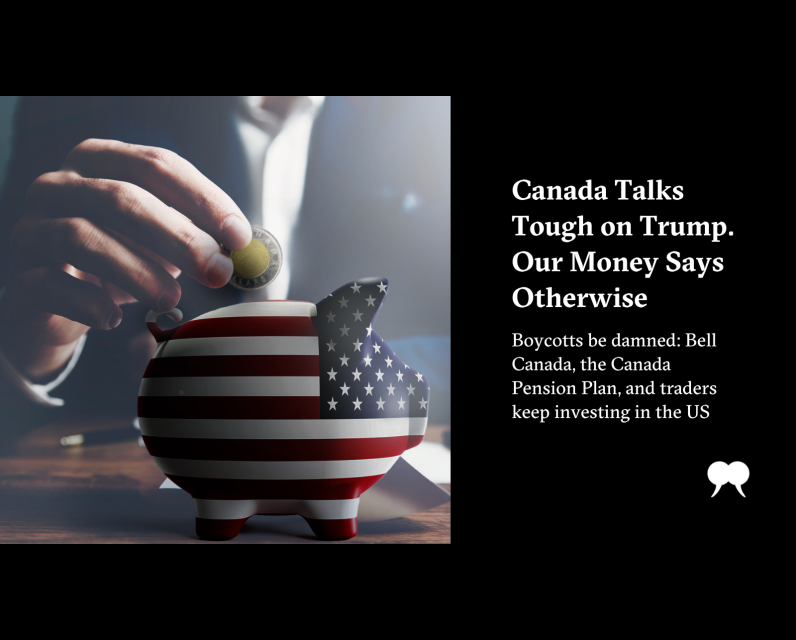Canada Talks Tough on Trump. Our Money Says Otherwise

At a downtown Toronto supermarket, Mary Brock stood over her cart, debating what not to buy. “Trump is causing a lot of trouble,” she told the Los Angeles Times in February. “I’d like to do my part.” And just like that, the shopper in the veggie section became the unlikely face of Canada’s resistance movement.
That spring, Donald Trump was levying tariffs against Canada, threatening industries, workers, and consumers, and musing about erasing the border and making the country the “cherished” fifty-first US state. Residents north of the forty-ninth parallel responded by boycotting American goods, scrapping stateside trips, pulling Yankee hooch from liquor store shelves, booing the Star-Spangled Banner, and returning a Liberal government that promised to get tough with Trump. Canadians were resolved to remain independent, and we’d assert our economic sovereignty if we had to. We’d build “One Canadian Economy,” our political elites insisted—trade amongst ourselves and turn outward, not southward, for new partners. We had all, in a way, become Mary Brock.
A cursory glance at Canadian history disabuses us of any notion that Canada is or can be independent of the United States, just as the tendency to regress to the mean reminds us that extraordinary occurrences tend to give way to a return to the ordinary. We can assert our sovereignty from time to time—officially sitting out the Vietnam and Iraq wars and developing deeper trade relationships with South America, Europe, or Asian countries, for instance. The Canada–US trade relationship, however, is worth more than $1 trillion a year, and roughly 80 percent of our exports go south, to states with which we’ve cultivated many industrial, cultural, and personal relationships.
We won’t abandon these arrangements if we can help it. Divorce would be too difficult and expensive, and we don’t want to. Trade and other experts will remind the gung-ho, go-our-own-way evangelists that geography, proximity, a shared language, and existing capital investment are much stronger than pro-Canadian battle cries—even stronger than deep concerns emerging from watching the collapse of American hegemony and the increasingly authoritarian politics of a US president cosplaying a late-stage Roman emperor. We may participate in our own small resistances, but the wheels of commerce will turn.
Ontario premier Doug Ford can make a grand display of ripping up a satellite internet contract signed with Elon Musk and Starlink, with a cancellation penalty the government won’t disclose, but a deeper look at truck and barter between Canada and the US tells a different story—as companies are caving to Trump and investing in the US despite, or even because of, tariffs. As Heidi Atter reports for the Independent, in May, Bell Canada cancelled plans to build out high-speed internet infrastructure in Labrador and, instead, cast its capital plans southward to “help bring high-speed internet to underserved communities south of the border.” Bell’s “growth strategy” is still rooted in extending its services “across North America.”
Bell isn’t alone. Canadian company AVL Manufacturing is investing $56 million in building a production facility in Charlotte, North Carolina, to make industrial power-generator enclosures. Quebec shipbuilding company Davie, a favourite of the Canadian Armed Forces, just made a $1 billion (US) deal to buy the Gulf Copper & Manufacturing Corp. in Texas as it looks to build more ships for the US, including icebreakers, which are, in a world that will be increasingly marked by the effects of climate change, of significant strategic importance to the Americans.
These examples are illustrative, and there are more of them. But companies aren’t alone. In the spring, finance writer Julie Cazzin noted in the Financial Post that it was easier for household investors to talk about taking a principled stand by divesting from the US than to actually do it. Boycotting US investments, she pointed out, would mean smaller returns, which people weren’t ready to accept. These stocks make people a lot of money, and Canadian equivalents aren’t as valuable or all that equivalent. And for those purchasing US treasury securities by the billions, the investments appeal as a reliable source of returns despite the country’s descent into populist authoritarianism.
Convictions are easy until they cost you. Some Canadians have become “rabid” label checkers, reports the CBC, averse to buying anything “Made in the USA.” And alongside those diligent shoppers are patriots refusing to cross the border, boycotting trips to Las Vegas or Disney World—a shared form of protest that is harming the American tourism industry, costing it billions. But while American products sit on grocery store shelves and hotel rooms sit empty, stocks are moving fast.
Canada itself is in on the trend. The national public pension plan—the CPP—has nearly half of its $714 billion fund invested in the US, compared to a mere 12 percent at home. It’s a strategy deployed by other pension funds that are chasing better returns stateside. All the stand-tall-for-Canada rhetoric is worth a small fraction of the heft of pension funds backed by thirteen figures. These funds exist to make money, so money they’ll chase just about wherever it leads them. American companies tend to be more productive and valuable than others, which is both an indictment of the Canadian marketplace and a reality investors are stuck grappling with—or not.
Even if Trump ushers in decades of distrust in the US, inducing Canada and other countries to look abroad to hedge trade and security arrangements, most of the world still wants—and needs—to do business with the US. The Canadian auto industry is utterly dependent on its integration with American automakers and consumers. The aluminum and steel industries, which have been hit with tariffs, rely on raw exports stateside. Canada sends more beef and cattle to the US than anywhere else—nearly 75 percent of total exports—worth roughly $5 billion a year. That’s a lot. But energy product exports hit $170 billion in 2024.
Mark Carney’s Liberal government has been working overtime to secure a trade deal with Trump, to establish what they hope will be a predictable environment for industry and limited tariffs. The Liberals don’t want to abandon the US. They can’t. And they’ve been happy to securitize the border, pledge billions more in defence spending, and cancel the digital services tax that Trump, and Biden before him, labelled a trade irritant.
Canadians and their government like having it both ways: tough, feel-good talk about resisting American bullying and asserting our sovereignty while cashing in on American investment opportunities and gobbling up American cultural products. Individuals and the occasional company may be willing to make certain sacrifices, but our collective preferences show that we’re willing to go only so far, and escaping the American orbit entirely is simply too far. Where would we even go? Supply chain integrations, such as in the textile and auto industries, run deep. Capital investments in resource development are more or less sunk costs—you can’t just up and move sites and massive equipment and infrastructure.
There is no such thing as total economic sovereignty in the contemporary world, certainly not for Canada. The UK tried something like it with Brexit, only to renegotiate trade with Europe, and it cost them dearly. In decoupling from the US at scale, Canada would risk collapse in industries bound up with the American market, job losses, higher prices, and god knows what sorts of retaliation from Trump or whoever else. We can talk about having our elbows up all we want, but the rhetoric is thin, as is our commitment to any serious sacrifice that can’t be readily offset with a good, service, or travel destination of similar or equal value.
In the end, we’ll keep talking like Brock but investing like Bell. A robust return in the marketplace will take precedence over a commitment to anything more grand or sufficiently abstract for us to assert. At the end of the day, one can’t survive on principles alone, and we won’t even really try.
The post Canada Talks Tough on Trump. Our Money Says Otherwise first appeared on The Walrus.


Comments
Be the first to comment